The Ultimate Overview of Pressure Washer Hose :
Every Little Thing You’re The Ultimate Overview to Pressure Washing Machine Tubes:
Every Little Thing You Required to Know Pressure washing machines are effective devices for taking on hard cleansing work, yet the pressure washer hose is the unrecognized hero that makes certain water is supplied where it’s required.
Whether you’re cleansing your driveway, auto, or exterior siding, the best pipe can make all the distinctions in performance and efficiency.
Pressure washing machine tubes are made from resilient products and are strengthened to endure high pressure without breaking or kinking.
In this extensive overview, we’ll check out every little thing regarding pressure washing machine tubes: their kinds, products, sizes, compatibility, and upkeep ideas. We’ll additionally consist of an FAQ area to attend to one of the most frequently browsed concerns concerning pressure washing machine hose pipes.
What Is a Pressure Washer Hose?
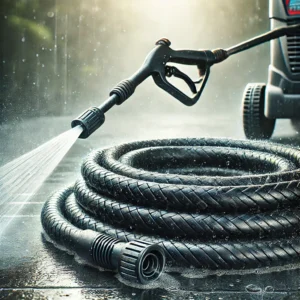 A pressure washer hose, commonly pertained to as a stressful cylinder, serves as the link in between the pressure washer as well as the spray gun or even nozzle. mainly regular garden hoses, these specialized pipes are actually created to resist the extreme pressure generated due to the device, which can vary anywhere coming from 1,500/ one many thousand five hundred PSI to over 4,000/ 4 1000 PSI.
A pressure washer hose, commonly pertained to as a stressful cylinder, serves as the link in between the pressure washer as well as the spray gun or even nozzle. mainly regular garden hoses, these specialized pipes are actually created to resist the extreme pressure generated due to the device, which can vary anywhere coming from 1,500/ one many thousand five hundred PSI to over 4,000/ 4 1000 PSI.
1. Light-Duty Hoses
PSI Range: Up to 2,000 PSI.
Suitable for domestic usage with electrical pressure washing machines.
Best for jobs like cleansing autos, outdoor patios, and outside furnishings.
2. Medium-Duty Hoses
PSI Range: 2,000– 3,000 PSI.
Appropriate for gas-powered pressure washing machines. Great for cleaning up decks, fencings, and tiny business jobs.
3. Sturdy Hoses
PSI Range: 3,000– 4,000+ PSI.
Made for professional-grade pressure washing machines. It is
perfect for commercial cleansing, graffiti elimination, and various other required jobs. The product of a pressure washer hose identifies its resilience, adaptability, and weight.
Products Used in Pressure Washer Hoses:
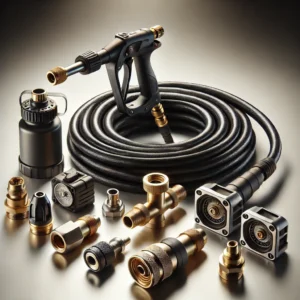
1. Rubber.
Sturdy and immune to heat. Adaptable and kink-resistant, however, much heavier than various other products.
2. Polyurethane (PU).
Lightweight and abrasion-resistant. Superb versatility, making it optimal for sturdy jobs.
3. PVC (Polyvinyl Chloride).
Cost-effective and lightweight. Rigid and vulnerable to kinking, making it much less easy to use.
4. Steel-reinforced.
Exceptionally solid and efficient in taking care of extremely high stress.
Best for commercial or commercial-grade applications. Aspects to Consider
When Choosing a Pressure Washer Hose?
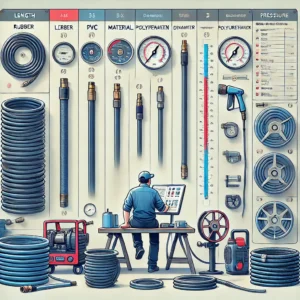
When choosing the best pressure washer hose, maintain these considerations:.
1. Compatibility.
Inspect your pressure washing machine’s PSI and GPM (gallons per minute) rankings to make certain the hose pipe matches its requirements. Making use of a tube with a reduced PSI ranking can bring about harm or rupturing.
2. Size.
Pipes normally vary from 20 feet to 100 feet. Much shorter tubes are less complicated to handle, while longer hose pipes offer higher reach but might lower water pressure.
3. Diameter.
Tube size influences water circulation and compatibility with the equipment. Typical dimensions consist of:
. 1/4 inch: For light-duty washing machines, as much as 2,700 PSI.
5/16 inch: Medium-duty usage with washing machines, approximately 3,400 PSI.
3/8 inch: Heavy-duty and professional-grade washing machines.
4. Connection.
Guarantee the hose pipe installations work with your pressure washing machine and spray weapon. Quick-connect installations are hassle-free and commonly made use of.
5. Adaptability.
An adaptable pipe is much easier to navigate, specifically for jobs calling for motion around barriers.
6. Resilience.
Pick a hose pipe that can hold up against constant usage and extreme problems. Steel-reinforced or polyurethane hose pipes are terrific for lasting toughness.
How to Install a Pressure Washer Hose?
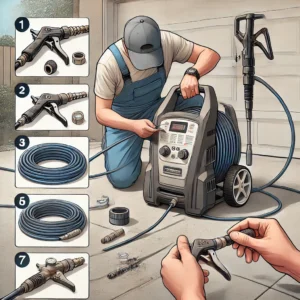
Mounting a pressure washer hose is simple if you comply with these actions:
1. Examine Connections.
Make certain the installations on the pipe suit those on your pressure washing machine and spray weapon. Usage adapters if essential.
2. Connect the Hose.
Link one end of the tube to the equipment and the other to the spray weapon. Usage quick-connect couplers for a less complicated setup.
3. Protect the Connections.
Tighten up all installations to avoid leakages; however, stay clear of overtightening, which can harm the strings.
4. Examination for Leaks.
Activate the pressure washing machine and look for any leakages around the links. Readjust as required.
Read About: air hose
Tips for Maintaining Your Pressure Washer Hose.
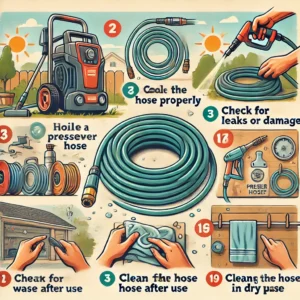
1. Stay clear of Kinking.
- Also sturdy pipes can damage with time if often kinked. Coil the hose pipe appropriately after usage to stop damage.
2. Shop Properly.
- Maintain the pipe in a great, completely dry location, far from straight sunshine or severe temperature levels.
3. Tidy After Use.
- Flush the hose pipe with tidy water after making use of cleaning agents or chemicals to avoid deposit build-up.
4. Evaluate Regularly.
- Look for fractures, leakages, or vulnerable points. Change the tube right away if you observe substantial wear or damage.
5. Usage Correct Fittings.
- Make certain the hose pipe links are limited and suitable to prevent unneeded tension on the hose pipe.
FAQs About Pressure Washer Hoses
1. How can I determine the right pipe size for me?
- Choose the right size for your cleaning needs. For most household tasks, a 25-foot-long hosepipe is sufficient. However, a larger hose pipe of 50 to 100 feet will be better for large areas or industrial purposes.
2. How can I repair a damaged pressure washer hose?
- Pipe repair kits can sometimes be used to fix small leaks or other problems. For major damages, or if safety is at risk, it may be best to replace the entire hosepipe.
3. What is the difference between 1/4 inch and 3/8 inch hose pipes?
- Size affects water flow and compatibility with pressure. The 1/4-inch tubing is suitable for washing machines that are not heavy-duty, while the 3/8-inch pipes work well for makers with heavier-duty and specialist use.
Final thought.
A pressure washer hose might look like a basic part, yet it’s a critical component of any pressure cleaning configuration. Picking the ideal pipe for your requirements– thinking about variables like product, size, and pressure ranking– can considerably affect your cleansing effectiveness and experience.
Whether you’re taking on light-duty jobs around your home or sturdy commercial cleansing, purchasing a sturdy, top quality pressure washer hose will certainly guarantee your system carries out at its ideal.
Comply with the pointers in this overview, and you’ll delight in a dependable, convenient cleansing experience for several years ahead!